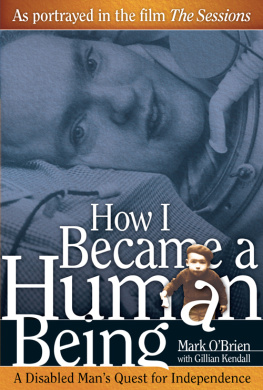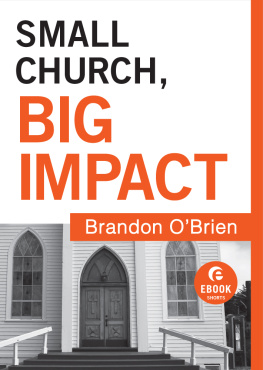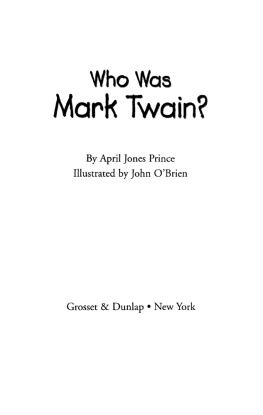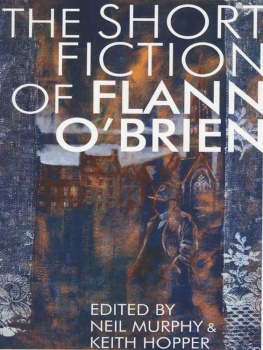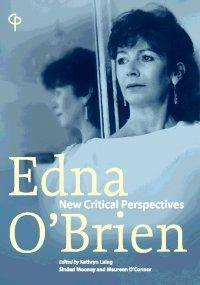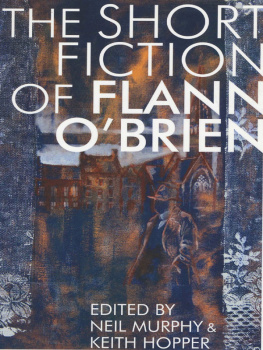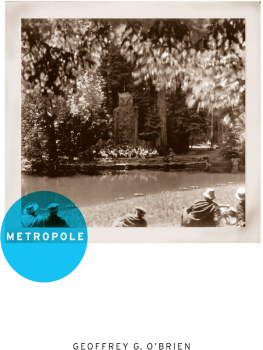How I Became a Human Being
A Disabled Mans Quest for Independence
M ARK OB RIEN
WITH G ILLIAN K ENDALL
THE UNIVERSITY OF WISCONSIN PRESS
The University of Wisconsin Press
1930 Monroe Street, 3rd Floor
Madison, Wisconsin 53711-2059
uwpress.wisc.edu
3 Henrietta Street
London WC2E 8 LU , England
eurospanbookstore.com
Copyright 2003
The Board of Regents of the University of Wisconsin System
All rights reserved. No part of this publication may be reproduced, stored in a retrieval system, or transmitted, in any format or by any means, digital, electronic, mechanical, photocopying, recording, or otherwise, or conveyed via the Internet or a website without written permission of the University of Wisconsin Press, except in the case of brief quotations embedded in critical articles and reviews.
Printed in the United States of America
Library of Congress Cataloging-in-Publication Data
OBrien, Mark, 19491999.
How I became a human being : a disabled mans quest for independence /
Mark OBrien with Gillian Kendall.
p. cm. (Wisconsin studies in autobiography)
ISBN 0-299-18430-7 (cloth : alk. paper)
1. OBrien, Mark, 19491999Health. 2. Physically handicapped RehabilitationWisconsin. I. Kendall, Gillian. II. Title. III. Series.
RM930.5.u6 024 2003
362.1968350092dc21
2002010451
ISBN 978-0-299-18434-6 (pbk. : alk. paper)
ISBN 978-0-299-18433-9 (e-book)
For Walter and Helen,
who gave me life and saved my life.
Free at last, free at last,
Thank God Almighty!
Im free at last.
TRADITIONAL SPIRITUAL
Contents
Preface
For the majority of his life, Mark breathed exactly eighteen times a minute, his air controlled by the wonderful, terrible iron lung in which he lived. That rhythm also limited his speech, sometimes fragmenting it, as he could speak only during the brief, controlled exhalations. Often, there were sudden breaks in his conversation, pauses in the middle of sentences, breaths before a single word. Other times, he rushed a sentence to get it out in time. That rhythm, I think, also affected Marks written language, keeping it concise, briefand sometimes a bit telegraphic. In chapter 11, Mark talks about the similarity between journalism and poetry, the need for precision and brevity in both. The journal entries Ive seen and his letters and emails to me were similarly pithy, and, in conversations during our fifteen-year friendship, he spoke bluntly and forcefully, but never at length.
As coauthor, my job has been to slow down and expand the stories behind Marks poetic, journalistic style. Working with Mark, I asked him to explain quick references or throwaway sentences, which often stood for whole scenes or complicated emotions. Our work went best when I was by Marks side, he relating stories, I writing down not his exact words but his ideas, memories, and feelings.
When Mark died, in 1999, we had a complete draft of a book but not a fully developed story. Where I trusted my own memories or perceptions not to betray Marks meaning, I have tried to fill in some spaces and to provide transitions and clarifications. In the places where the text remains elliptical, it is because I have not known enough to fill out the outlinesadly, there are many things about my friend that I didnt know enough about, didnt think to ask while I was able to. And in some instances, Mark substituted fictitious names for real ones, to hide identities.
After Mark died, I asked for one of his mouthsticksthe wood-and-plastic tools he used for typing. I keep it as a reminder of how dedicated Mark was to communication and self-expression, to remind myself to work as hard as he did.
A reporter once asked me why I thought Mark had stayed alive so long. For what purpose? I said that I didnt think Mark needed to define his lifes purpose any more than anyone else did; most peoples raison dtre changes or remains undefined. There was considerable pressure on Mark to live for something or someone else, to stand for some ideal, to represent some group. One of his achievements was that he lived for himself, his writing, and the people he was close to, refusing to limit himself in political or didactic terms.
Sharing the work of writing Marks biography has been an honor, and I am grateful to Birmingham-Southern College for a grant toward work on an early draft. I am glad that the book will make Marks story available to many readers of different abilities and backgrounds, especially to people who live in countries that lack legal support and protection for the disabled.
GILLIAN KENDALL
Illustrations
Prologue
On the day I graduated from the University of California, Berkeley, on the night that Jessica Yus documentary about me won an Oscar, and at other times, I have been praised for being a hero, but heroism has had little to do with my achieving success at Berkeley or elsewhere. I was the beneficiary of a deep and important change in society. In my first published article, in CoEvolution Quarterly, I tried to explain that change: I still cannot sit up straight, turn my head to the left, or sleep outside of a respirator. But these problems no longer set me apart or mark me as a freak as they did when I was a child and an adolescent. The reasons for this change have more to do with the nature and the quality of society than they have to do with how much responsibility a society will entrust to disabled people.
For centuries, disabled people had been locked up in state-owned or state-subsidized institutions. We will never know how many lives were wasted, how many intellects dulled, how many souls murdered, through that system. The people who began and ran this system were good people who thought of themselves as reformers helping the helpless. But they never asked us what we wanted.
Freedom.
Ed Roberts, Judy Heumann, and Hale Zukas led the change, demanding that society free us from the living death of nursing homes. They and others demonstrated, argued, and fought for attendant programs to pay people to work for us in our own homes. These programs give us the power to hire, train, and fire the people who wash, feed, dress, and lift us. Other changes were begun as well, such as disabled students programs, state payment for power wheelchairs, and laws forbidding discrimination against disabled people. But attendant programs were the most essential. Without them, I would still be stuck in a nursing home.
These changes have freed thousands of disabled people. However, thousands of others remain in nursing homes, trapped by the failure of Congress and of state legislatures to enact laws that will permit all of us to live, with the help of attendants, outside nursing homes. I have been lucky enough to live in California, a state that has a good attendant program. I hope other states will free their disabled people.
That first published article, How I Became a Human Being, showed that independent living changed how I am perceived.
[People] began to treat me as if I were a human being. Its
strange to tell because up until then people had made me feel as
if I were something else, something less, something not capable
of bearing personal responsibility. Because this society has, by
unspoken agreement, defined a human being as someone who
can bear the major responsibilities required for a self-directed life,
I was not a human being. Nor are convicts, children, or retarded
people regarded as such. But now that I have been given this

